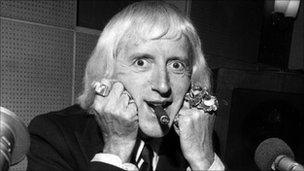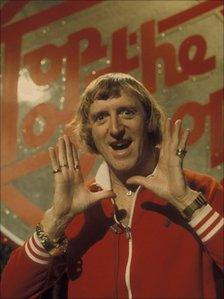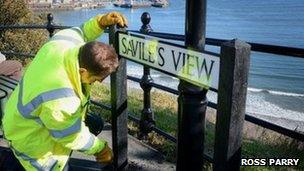Sir Jimmy Savile in profile
- Published

Sir Jimmy Savile was accused of sexually abusing five teenage girls in an ITV documentary
When Sir Jimmy Savile died in October 2011, it was his trademark tracksuit, cigar and catchphrase "Now then, now then," that many remembered.
But in the year since his death, claims have surfaced alleging he sexually abused girls while working at the BBC.
In an ITV documentary on 3 October, five women alleged that Sir Jimmy sexually assaulted them as teenagers.
After assessing allegations against him, Scotland Yard have launched a joint investigation with the NSPCC to pursue 120 separate lines of inquiry.
Commander Peter Spindler, head of specialist crime investigations at the Metropolitan Police, said police had recorded eight allegations against Sir Jimmy, including six indecent assaults and two rapes.
Cdr Spindler praised the alleged victims for "shining a light" on the abuse.
BBC director general George Entwistle has since promised a "comprehensive examination" of the allegations, after the Met has finished its inquiries.
The claims cast a shadow over the career of the 84-year-old, who was one of Britain's most established showbusiness figures and a prolific charity fund-raiser.
The country's first pop disc jockey, Sir Jimmy was also a seasoned television presenter, the iconic Mr Fixit, a marathon runner, Mensa member, wrestler and fund-raiser.
He was never charged with any abuse offences during his lifetime.
Born performer
Jimmy Savile was born on 31 October 1926 in Leeds, the youngest of seven children.
During World War II he was conscripted as a Bevin Boy, working in the coal mines as an alternative to active service in the armed forces.
BBC Director General George Entwistle: ''These are awful allegations''
In an era dominated by live music, he started playing records in local dance halls.
In 1947, according to his autobiography, he started using twin turntables and a microphone, effectively becoming the first disc jockey.
A born performer, Savile was spotted by television cameras spinning discs at his own Plaza dance hall in Manchester.
He grasped the opportunity to become a broadcaster, working at Radio Luxembourg before moving to Radio One.
He was the first host of Top of the Pops in 1964 and helped front the programme for more than 20 years.
Sir Jimmy also had a role on the music show's final edition in 2006.
Even among his fellow medallion men Savile revelled in his eccentricity, hanging upside down, appearing in a banana costume and generally refusing to follow fashion.
He was on BBC television for nearly two decades from 1974 in his guise as a perennial Santa Claus, granting viewers' wishes from his magic chair on Jim'll Fix It.
The programme received 20,000 letters a week. A handful of correspondents went on to see their dream come true and with it they received a treasured Jim'll Fix It badge.

Savile was one of the hosts of Top of the Pops for more than 20 years
Allegations emerge
But it was during this period that Sir Jimmy allegedly sexually abused teenage girls, five of whom made their claims public during an ITV documentary that aired on 3 October 2012.
During Exposure: The Other Side Of Jimmy Savile, one woman alleged she was raped by Sir Jimmy, with another describing how she was asked to perform a sex act on him.
Another woman described how, as a 14-year-old in 1974, she met Sir Jimmy at a school in Surrey and was assaulted in his caravan, while it was parked in the school grounds.
One woman also explained she was too frightened to make her claims public while the presenter was alive.
Sue Thompson - a former newsroom assistant at BBC Leeds - also claimed she walked into the star's dressing room after a TV recording and found Sir Jimmy with a young teenager.
In the aftermath of the ITV documentary, the Met said it would weigh up evidence against Sir Jimmy.
After several days, the force announced it was pursuing 120 separate lines of inquiry and added there could be up to 30 victims spanning four decades.
Cdr Spindler said Sir Jimmy's pattern of offending behaviour appeared to be on "a national scale" and he had a "predilection for teenage girls".
It also emerged that Surrey, Sussex and Jersey Police had all received complaints about Sir Jimmy but concluded there was not enough evidence to pursue them.
Journalist and presenter Janet Street-Porter claimed on BBC Question Time that there was a culture of "inappropriate sexual behaviour" in the light entertainment industry and added she "was aware of the rumours about Jimmy Savile" during her time as a BBC executive.
As the controversy grew, tributes to the presenter's charity work, including a Savile's View footpath sign in Scarborough were removed and trustees at the Jimmy Savile Charitable Trust said they were considering whether to change its name. There were also calls for him to be stripped of his knighthood.
The newly appointed boss of the BBC, George Entwistle, apologised on Radio 4's Today programme to the women involved and promised an internal investigation once the police inquiries were completed.
Complex personality

A workman begins the task of removing the sign in Scarborough
Sir Jimmy's family have jumped to the defence of the deceased entertainer.
His nephew Roger Foster said he was "sad and disgusted" by the claims and added he feared the allegations "could affect his legacy, his charity work, everything".
The star ran more than 200 fundraising marathons and as a devout Roman Catholic was given a Papal knighthood for his efforts.
He was similarly rewarded by the Queen in 1990 and acted as an unofficial adviser to the Prince of Wales for a number of years.
His appearance - that of a platinum-haired, cigar-smoking, entertainment stalwart - hid a complex personality.
He eschewed the services of a manager or secretary, and shrank from the intimacy of personal relationships.
He saved his greatest affection and reverence for his late mother, whom he called the Duchess. He lived with her until her death in 1973 and continued to own the house they shared until he died.
Of his own persona, Sir Jimmy said: "The reason I can do things that other people can't is because I'm a single guy and have plenty of time.
"I don't want anything from anybody. I'm just unusual."